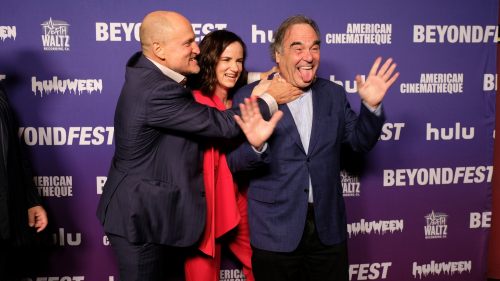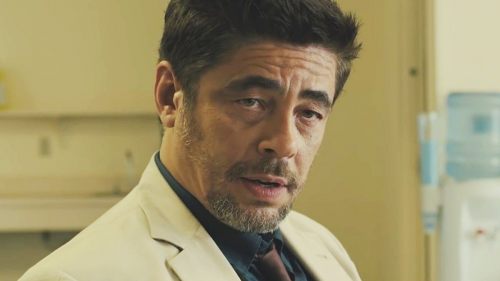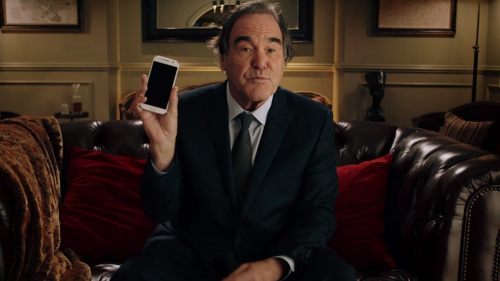The Magic Bullet: The Dangerous Power Of JFK
Get registered to vote if you haven't already. It only takes a moment!
Conspiracy thrillers as a subgenre have a uniquely complex position in the realm of political cinema. The Conversation, The Manchurian Candidate, Capricorn One - these are films singularly keyed in to domestic anxieties, examining the fears that arise when the foundations of a national identity are threatened. Individually, these films demand that we question the powers-that-be, but still retain that essential element of fiction. When the lines of fact and fiction become blurred, however, the distrust these films sow in our institutions (justified or not) turns into an issue of responsibility - do the filmmakers have a duty to tell us if they’ve fudged the facts?
Oliver Stone’s JFK - the big daddy of the conspiracy genre against which all others must be judged - depicts New Orleans DA Jim Garrison (played with all-American aw-shucks sincerity by Kevin Costner) bringing a case against Clay Shaw (Tommy Lee Jones, outrageously bewigged) who may or may not be at the centre of a vast plot to assassinate John F Kennedy, sparked by the young President’s supposed desire to dismantle the military industrial complex. Twenty-seven years since its release, JFK is a fascinating historical document, weaving a labyrinthine web of enemies against Camelot - from the CIA to Cuba to the Mafia to an underground cabal of nefarious homosexuals (really). Stone’s three-hour-plus magnum opus, an exhaustive and exhausting political thriller-cum-diatribe, employs an immense cast of characters and a jumble of seemingly innocuous details into one of the most utterly convincing falsehoods ever put to screen. A masterpiece, but a deeply irresponsible one, JFK is a film that fundamentally changed national conversation and set the scene for the pervasiveness of the American conspiracy theory in the modern discourse.
Stone, whose ideologies almost always trump character, plot and, in this case, factual evidence, willfully warped elements of the Kennedy assassination in order to make the film more palatable and compulsively watchable - admittedly quite a feat for a movie that stretches so long and mostly features lawyers shouting at each other across tables. Inspired by films such as Rashomon and Z, Stone builds a case of objective truth by repeatedly recontextualising events we think we know, dead-set on convincing the audience that the sensationalized account - with all its suspicious witness deaths, dramatically traitorous allies and impassioned courtroom speeches - actually happened in real life. Stone understands what lies at the heart of the intoxicating, alluring draw of the conspiracy theory – the human desire for an anchor in the midst of chaos. JFK is convincing – terrifyingly so – and by the end we’re incensed, despite knowing that what we’ve seen is simply too conveniently structured to be based in truth. Audiences, particularly Western ones, love a story classically told – the beginning, the middle and the end. There is an intense desire for the events around us to be put into a context that makes sense to us – that terrible events aren’t meaningless, that the things that define our national identity do so for a reason.
Besides the film’s insistence of its own truthfulness, JFK is brilliant in shape and execution, particularly for a film that largely eschews the hallmarks of good script writing – character development, subtlety, and avoiding exposition. Stone brought in advertising editor Hank Corwin to oversee the assembly of the cut, inspired by Corwin’s ‘chaotic mind’ being ‘totally alien to the film form’. To his credit, JFK is one of the best-edited film of the nineties – the most significant element of the film’s persuasiveness. Much like an advert, the film’s swirling flurry of historical footage, recreations, and staged scenes woven together in rapid, subconsciously manipulative and repetitive sequences work to make us want to buy the story. This is combined with one of John Williams’ most intense and unsettling scores, an alarming soundtrack that warps and twists riffs and sounds defined by their patriotism. Staccato military drums and chirping funereal trumpets become something uncanny and perverse. The overall feeling is one of sinister, silky menace that only comes about when everything you think to be true is called into question – true, existential horror.
Conspiracy theory films are built on binary ideals – their plot points may be complex but there is always a good guy and a bad guy, or more specifically, a bad set of institutions. Stone’s idealism, which is perhaps at its most overt in this film, has in recent years curdled into something more sinister – both personally as the subject of abuse allegations and in his work, specifically his unsettlingly cozy recent portrait of Vladimir Putin. And yet, for all of JFK’s flaws, some of the messages put forth in this film ring true today – the warnings against the monetizing of war and conflict and the refusal to waive national horrors away as simply the acts of lone madmen - in this case Lee Harvey Oswald, who shares many, many characteristics with the string of angry, radicalized young white men whose faces are now forever synonymous with a particular strain of national tragedy.
What validity can we take from JFK as a work of art? It is undeniably a majestically mounted achievement, but it is also damaging propaganda. It’s no coincidence that the film is so often compared to Leni Riefenstahl’s Hitler-celebrating Triumph of the Will. Both work to convince impressionable viewers of the truthfulness of their ideological fiction, and both are astonishingly successful in that mission. JFK is irresponsible art, and yet were it to be contextualized with a warning against its accuracy, would its titanic power be so palpably compelling to the viewer? The central question remains – does a film have a responsibility to define its own truthfulness, or does that responsibility lie with the viewer to remain skeptical? Garrison’s crusade – misguided, arguably deeply homophobic and damaging – was not the act of selfless heroism JFK makes it out to be, and yet here Stone paints falsehood in the name of ideological truth as heroic, in the attempt to harness a deep national fury, and to give it shape.



